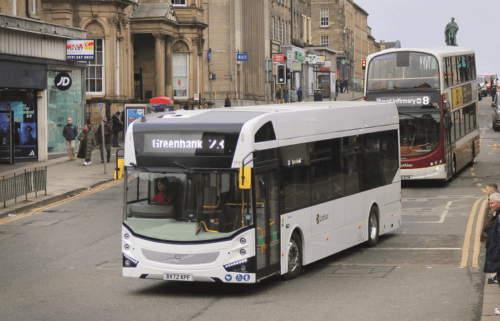
The CPT says that major benefits could be reaped by levelling the playing field between private motoring and public transport in Scotland, according to a report commissioned by the trade body and produced by WPI Economics. The report followed on from a study last year which showed that attracting drivers to switch some journeys to bus or coach was necessary to meet net zero targets.
After a 70-year decline in bus travel, the report says that focusing on one policy alone won’t achieve the desired net zero outcomes, and that increasing motoring costs in isolation would impact those who don’t have any other option to use their cars. An alternative option of making bus travel free across Scotland would cost millions without having a significant impact on people’s travel choices, the report says, calling for a realistic, fair and politically achievable package of policies to encourage people to switch two car journeys a month to bus or coach. This will, it says, ensure a reduction in emissions of 1.1 million tons of CO2.
The CPT believes that moving more people onto coaches or buses also has the potential to unlock other benefits, including £3.4bn of socio-economic benefits from changes in travel patterns, £800k in air quality benefits from reduced congestion, 3,000 new jobs and £180m in additional GDP through better connectivity to job and services.
Director at WPI Economics Matthew Oakley commented: “A holistic policy package that combines several, sensible interventions will help to make buses and coaches a more regular choice. Without a significant step change in Government policy, current decarbonisation targets will not be met.”
CPT Scotland Director Paul White added: “Without long-term investment in the funding of services and infrastructure to make bus and coach journeys more attractive for passengers, Scotland will not be able to effectively contribute to Scotland’s 2045 Net Zero target. This is why decision-makers in Scotland should get on board with bus policy packages because they are fair and achievable measures to slash carbon, generate new tax revenue, create more jobs and make people healthier.”
To fully meet its decarbonisation targets, bus packages across Scotland must cover three key policy areas, the CPT says: investment in bus services and infrastructure to increase attractiveness of the bus network; subsidising bus fares; and charging motorists to drive in congested urban areas. The organisation suggested that the combination of £118m per year investment in bus services with a £2 fare cap and a congestion charge in urban local authorities could get Scotland three quarters of the way to its net zero goal and reverse a decline in passenger numbers of 25% over the past decade.

